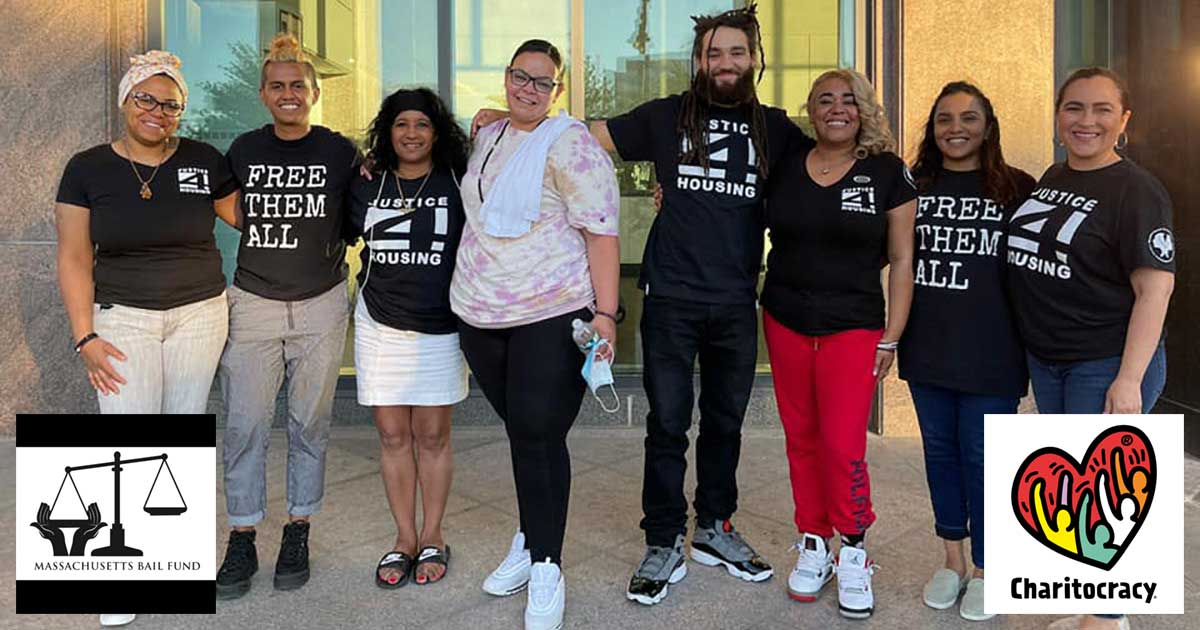
Next in our series of posts about new Charitocracy nominees, we have nominee Massachusetts Bail Fund, nominated by donor jzp-charitocracy. They pay bail so low-income people can stay free while they resolve their cases, keeping families and communities stable. You can find their web site here.
A few words on Charitocracy
Firstly, for newcomers: here's how it works. Donors pool their monthly contributions, as little as $1. The cause with the most votes each month wins the pot. No matter how much or how little you contribute, each donor at Charitocracy gets one vote. This is where charity meets democracy. So please share this post (see social sharing icons at top of post) and ask your friends to join us and vote! That's how we spread the word and, as a result, grow the monthly pot. The bigger the pot, the bigger our positive impact on the world!
About nominee Massachusetts Bail Fund
"There can be no equal justice where the kind of trial a man gets depends on the amount of money he has.”
-U.S. Supreme Court Justice Hugo Black, 1964
The Massachusetts Bail Fund posts bails for people who can't afford to pay their own bails in Massachusetts.
Mission:
The Massachusetts Bail Fund pays bail in Massachusetts so that low-income people can stay free while they work towards resolving their case, allowing individuals, families, and communities to stay productive, together, and stable. The Massachusetts Bail Fund is committed to the harm reduction of freeing individuals serving pre-trial sentences, and to abolishing pre-trial detention and supervision in the long-term.
Massachusetts jails are filled with people awaiting trial simply because they cannot afford bail. Bail leads to longer incarcerations times, lost jobs, lost housing, and devastated families. The Massachusetts Bail Fund provides bail for people who cannot afford to pay.
History:
When someone is arrested in Massachusetts, a bail commissioner at the police station or a judge at the courthouse decides whether or not the individual will be required to provide money that will ensure that they return to court. This money is their bail. If they cannot afford it, they will be held in jail until their case is over.
According to Massachusetts Law, bail is meant to ensure that people return to court. The bail amount set by a judge does not always reflect the seriousness of a charge. Low bail can be set on any of number of charges, including felonies. A group of defense attorneys and social workers noticed that it was instead keeping their clients behind bars. Many of their clients were spending months or years in jail awaiting the conclusion of their cases simply because they couldn't afford their bail, sometimes as little as $25.00. As a result clients were forced out of their homes, jobs, and communities, making effective representation and treatment increasingly difficult. The Massachusetts Bail Fund was created to address this inequity. Using all donated funds, the Bail Fund provides bail assistance for low-income individuals.
'The cost' of bail:
Being held during the pretrial period has disastrous impacts on a person’s life. Incarceration of even a few days can have a serious impact on defendants' families, housing, employment, and health. People are fired from jobs, evicted from public housing, dropped from public assistance, and kicked out of shelters. Students miss classes and parents lose custody of their children. Despite this cost, research shows that reliance on cash bail is no better than effective pretrial conditions or phone or mail reminders in ensuring that a defendant returns to court to address his or her case.
People who are held during the pretrial period are more likely to be convicted and receive harsher sentences than those who are released on bail. The longer a person stays in jail, the more likely he or she is to plead guilty to a crime simply because doing so would ensure release. The desire to go home is a powerful motivator and is used as a bargaining chip by the prosecution in order to push for a plea.
A defendant's ability to address legal charges while in the community rather than in jail results in better legal outcomes. The Massachusetts Bail Fund pays bail so that low-income people can stay free while they work towards resolving their case, allowing individuals, families, and communities to stay productive, together, and stable.
So please visit the page of nominee Massachusetts Bail Fund to vote for, like, or discuss this cause!




